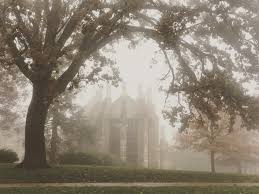Thursday
I’m still trying to figure out what it means to have come home to retire. Home, in my case, is the town of Sewanee, Tennessee, where I grew up and which I left when I turned 18, returning only for vacations and once for a year-long journalism stint (when I was 23). My friend John Gatta has been helping me understand what home means through his book Spirits of Place in American Literary Culture.
Noting that “no single word in English is more pervasively evocative than ‘home,'” Gatta examines various authors who have explored its meaning. For instance, he cites Marilynne Robinson’s novel Home, in which first Glory and then her brother Jack return home, each seeking some kind of stability. Jack, who rebelled against the small Iowa town, returns hoping that it will accept his union with a woman of color (the year is 1956). As Gatta notes, the act of homecoming speaks to “our insatiable longing for things enduring and ultimate.”
He also cautions, as Jack discovers, that “our mortal experience always falls short of [a place’s] promise.” The tolerant Iowa that Jack dreams of does not exist, and Gatta observes that “stories of homecoming…typically reveal more irony and pain than they do solace and blessing.”
Gatta mentions various religious authors who have described God as our final home. Only God can satisfy the “repining restlessness” of George Herbert, a phrase that appears in “The Pulley.” God in Herbert’s poem believes that only “weariness” will “toss him to my breast.” Only after we have thrashed, Herbert writes in “The Collar,” will we hear God calling:
And I replied My Lord.
Gatta also quotes the final words of Augustine St. Clair in Uncle Tom’s Cabin:
Augustine, sorely conflicted and self-estranged, ends up countering at the point of death a doctor’s judgment that “’His mind is wandering.’ “No!” he insists, “It is coming HOME, at last!…At last! At last!”
Home takes on mythical dimensions in The Odyssey. Odysseus lives a life of ease on Calypso’s island but, after seven years, is so overcome by homesickness that he risks death at sea. This in spite of being warned, by the dead Agamemnon, about what could await him. In Odysseus’s case, the longing is combined with a sense of duty, articulated by Zeus’s declaration that he has the higher destiny of kingship to fulfill.
Moving away from religion, John turns to Robert Frost’s “Death of a Hired Man,” where a man returns to his former work place in order to die. The husband cynically observes that home is
simply a last-ditch endpoint of life, nothing more than that “place where, when you go there,/They have to take you in.”
His wife, however, finds something more transcendent in the hired man’s return, saying, “I should have called it/Something you somehow haven’t to deserve.” Gatta notes that this resembles Christian notions of grace:
Something simply given, if experienced at all, rather than earned or deserved. For Christians, home viewed in this light carries unmistakable overtones of fittedness, of sacramental grace. Potentially, at least, home or another version of hallowed place qualifies as an incarnational sign of the numinous…
Gatta’s discussion of home thus highlights the central thesis of his book, which is that we assign spiritual significance to certain locales. Literature plays a major role in this process, manifesting
an enduring yet variegated fascination with spirits of place, often identified with those unfathomable, unmappable tokens of mysterious presence we either discover within, or attribute to certain sites more than others.
What light does this cast on my own decision to return to Sewanee? Every morning when I walk from my mother’s guest house to the big house, I marvel in prayerful silence at the overarching forest canopy, which is often punctuated by birdsong and the rat-a-tat-tat of pileated woodpeckers in the distance. Sewanee’s famous fog, some of which we experienced yesterday morning, renders everything mystical, all the more so because I remember if from my childhood. I do indeed feel that I am walking on hallowed ground.
“Home is where one starts from,” T. S. writes in an “East Coker” passage that Gatta quotes and then later, “In my beginning is my end.” Gatta writes,
Such domus-honoring conviction supposes in turn that where we live, especially in our primal dwelling, is a place enveloped in something like a palpable force field of spiritual energy.
To further capture the experience I am having, I add Eliot’s well-known passage from “Little Gidding”:
We shall not cease from exploration
And the end of all our exploring
Will be to arrive where we started
And know the place for the first time.
As I seek to know the place for the first time, I can’t say how much of my strong connection to Sewanee is due to the fact that my 93-year-old mother is still living. Will some link be broken when she passes on? Or will the bond with place become yet stronger because I will sense her presence in the surroundings. I regularly think of my father’s love for the woods when I’m out hiking so I think it may be the latter.
As he surveys the Wye River from a gorgeous spot a few miles above Tintern Abbey, Wordsworth imagines how his sister will experience this place once he is no longer around. I imagine my parents passing on to me the poet’s advice to Dorothy, reminding me
That on the banks of this delightful stream
We stood together; and that I, so long
A worshipper of Nature, hither came
Unwearied in that service: rather say
With warmer love—oh! with far deeper zeal
Of holier love. Nor wilt thou then forget,
That after many wanderings, many years
Of absence, these steep woods and lofty cliffs,
And this green pastoral landscape, were to me
More dear, both for themselves and for thy sake!
Gatta is right that we invest certain places with mystical significance. Home is always more than just home.


